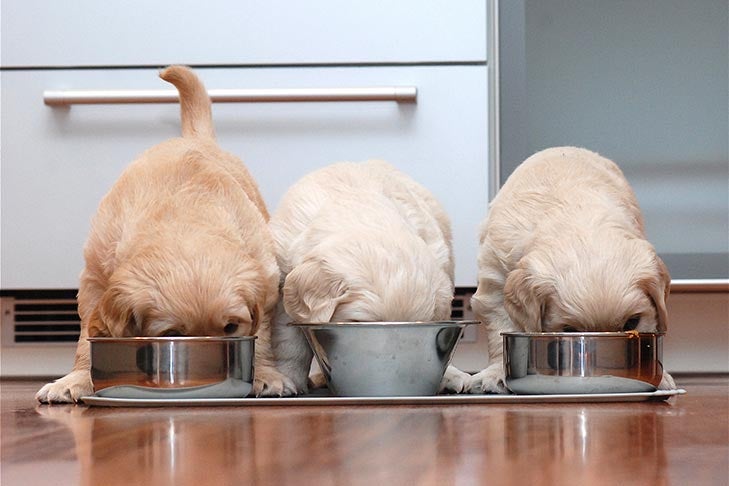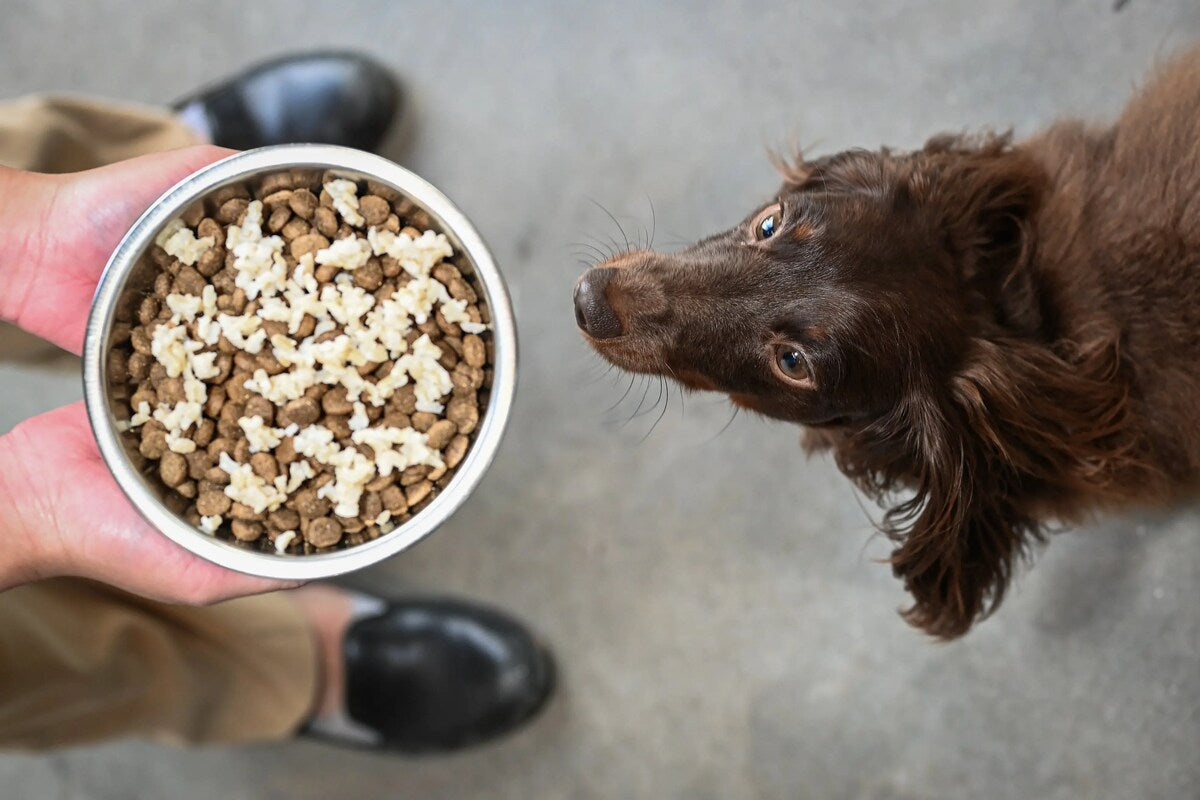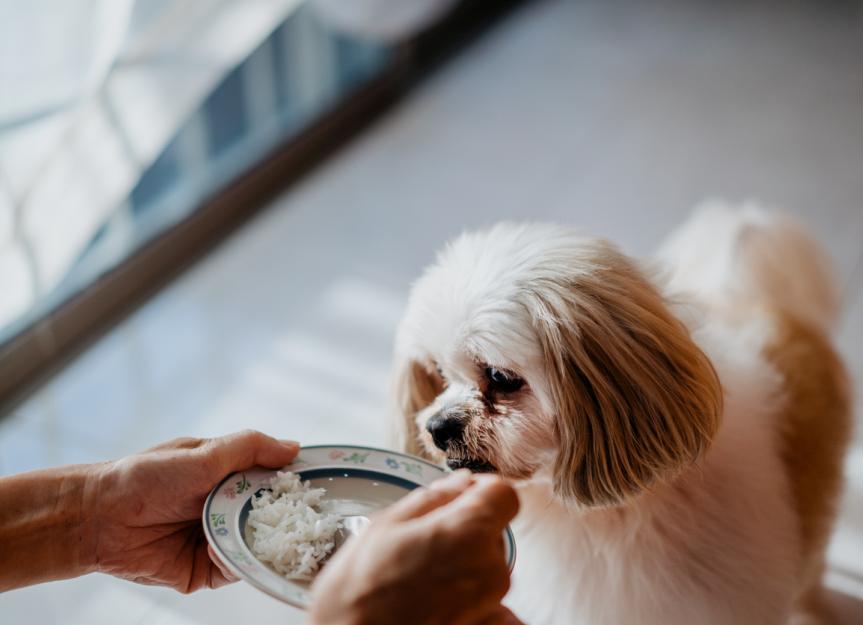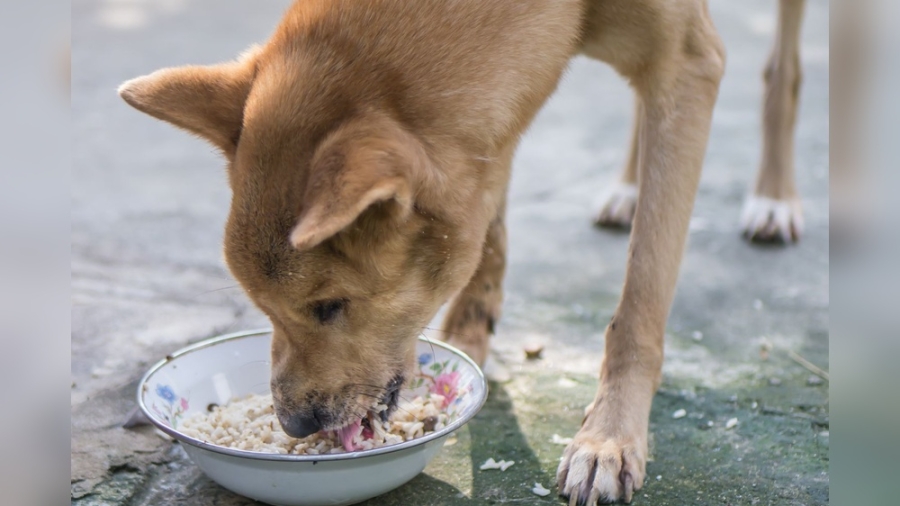If you’re wondering whether your poodle can eat rice every day, you’re not alone. Rice is a common ingredient in many dog foods and is often recommended for pups with upset stomachs.
But is it safe and healthy to make rice a daily part of your furry friend’s diet? Before you start scooping bowls of rice, it’s important to understand how it affects your poodle’s health, weight, and digestion. You’ll discover the benefits and risks of feeding rice regularly, learn when rice is a good choice, and get expert tips on serving it the right way.
Keep reading to make sure your poodle gets the nutrition they need without any unwanted side effects.
Rice And Poodle Diets
Rice is a common ingredient in many dog diets. It provides energy through carbohydrates. Poodles, like other dogs, can eat rice as part of their meals. Rice is easy to digest and gentle on their stomachs.
However, rice does not supply all the nutrients poodles need. Dogs require proteins, fats, vitamins, and minerals for good health. Rice alone cannot meet these nutritional needs. Feeding rice every day may cause problems over time.
Benefits Of Rice In A Poodle’s Diet
Rice offers quick energy for active poodles. It helps soothe upset stomachs by being bland and easy to digest. Many dog foods include rice as a filler or carbohydrate source. Rice is gluten-free, which reduces allergy risks for some dogs.
Rice lacks essential proteins and fats needed by poodles. Too much rice can lead to nutritional imbalances. Poodles eating rice daily may gain unwanted weight due to extra calories. Digestive issues like constipation or gas can also happen. White rice may cause blood sugar spikes, especially in diabetic dogs.
Balancing Rice With Other Nutrients
Poodles need a mix of proteins, fats, and vitamins daily. Rice should complement a well-rounded diet, not replace it. Adding lean meats, vegetables, and healthy fats keeps meals balanced. Always control rice portions to avoid excess calories. Consult a vet for personalized diet advice.

Benefits Of Rice For Poodles
Rice is a common ingredient found in many dog foods. It provides a good source of energy for active poodles. Rice is easy to digest, which helps dogs with sensitive stomachs. It also adds variety to their meals without causing allergies for most dogs.
Including rice in a poodle’s diet can support healthy digestion. It offers a gentle carbohydrate that fuels the body. Rice is also low in fat, making it a light option for dogs prone to weight issues.
Easy To Digest Carbohydrate
Rice breaks down quickly in the digestive system. This makes it ideal for poodles with upset stomachs. It can soothe digestion and reduce symptoms like diarrhea or vomiting. White rice, in particular, is gentle and often recommended by vets.
Provides Energy For Active Dogs
Rice contains carbohydrates that supply energy. Poodles, being active dogs, need fuel for play and exercise. Rice helps maintain stamina without adding extra fat. It supports daily activities and keeps your dog lively.
Low Allergen Ingredient
Rice rarely causes allergic reactions in dogs. This makes it safe for poodles with food sensitivities. It can be a good alternative to grains like wheat or corn. Using rice reduces the risk of skin or digestive allergies.
Supports Digestive Health
Rice helps promote smooth digestion in poodles. It can bind stool and ease bowel movements. This helps dogs with diarrhea or mild stomach upset. The fiber in rice also encourages healthy gut bacteria.
Risks Of Daily Rice Feeding
Feeding rice to your poodle every day can lead to several health risks. Rice alone does not provide all nutrients your dog needs. Over time, daily rice feeding may cause problems that affect your poodle’s well-being.
Understanding these risks helps you make better choices for your pet’s diet.
Nutritional Imbalance
Poodles need a diet rich in protein, fats, vitamins, and minerals. Rice mainly provides carbohydrates and lacks these essential nutrients. Relying on rice daily can reduce the intake of important nutrients. This imbalance may weaken your dog’s immune system and energy levels.
Weight Gain
Rice is high in calories and carbohydrates. Feeding rice every day can cause your poodle to gain excess weight. Extra weight puts stress on joints and may lead to other health issues. Active dogs might handle carbs better, but most poodles need balanced meals to maintain a healthy weight.
Digestive Issues
Too much rice can cause bloating and gas in dogs. White rice may help with diarrhea but lacks fiber. Brown rice has fiber, which in excess can cause constipation. Feeding rice daily without variety may upset your poodle’s digestion and comfort.
Blood Sugar Concerns
White rice has a high glycemic index. It can cause rapid spikes in blood sugar levels. This is risky for diabetic dogs or those prone to blood sugar problems. Regular high-carb meals may increase the chance of developing diabetes or insulin resistance.
Rice Types For Dogs
Rice is a common ingredient in many dog diets. It provides energy and is easy to digest. Not all rice types are the same for dogs. Knowing the differences helps choose the right kind for your poodle.
White Rice
White rice is simple and gentle on a dog’s stomach. It cooks quickly and is soft, making it easy to eat. This rice has fewer nutrients because the husk and bran are removed. It is low in fiber, which can help dogs with diarrhea. White rice can raise blood sugar fast. It is best used in small amounts or for short periods.
Brown Rice
Brown rice keeps the bran and germ, so it has more nutrients. It contains fiber, vitamins, and minerals that help digestion and health. The fiber can be too much for some dogs and cause constipation. Brown rice takes longer to cook and is a bit harder to digest. It is better for healthy dogs with no stomach issues. Portion size is important to avoid digestive problems.
When To Feed Rice
Rice can be a helpful part of your poodle’s diet at certain times. It is easy to digest and gentle on the stomach. Feeding rice every day is not ideal because it lacks important nutrients dogs need. Knowing the right moments to offer rice helps keep your poodle healthy and happy.
Rice works well as a short-term food during specific health situations. It should never replace a balanced diet full of proteins and fats. Use rice wisely to support your poodle’s digestion and nutrition.
Digestive Upset Relief
Plain cooked rice is often used to calm a poodle’s upset stomach. It helps firm loose stools and soothes digestive irritation. Rice is bland, which makes it easy to digest when your dog feels sick.
Mix rice with boiled chicken or a small amount of lean meat to create a gentle meal. This can help your dog recover from diarrhea or vomiting. Feed rice only for a few days during digestive troubles, then return to regular food.
Vet-recommended Diets
Veterinarians sometimes suggest rice as part of a special diet. This is common for dogs with certain health conditions or after surgery. Rice provides energy without stressing the digestive system.
Always follow your vet’s advice about how much rice to feed and how often. A vet-approved diet will balance rice with necessary proteins, fats, and vitamins. This keeps your poodle strong and prevents nutrient gaps.

Portion Control Tips
Controlling portion size helps keep your poodle healthy when feeding rice. Too much rice daily may cause weight gain and digestive problems. Balance rice with proteins and nutrients to support your dog’s overall diet.
Controlling the amount of rice your poodle eats is very important. Rice should not replace their main diet but serve as a small part of their meals. Too much rice can cause weight gain and digestive problems.
Start by measuring the rice carefully. Use a standard measuring cup to give your poodle the right portion. Adjust the amount based on your dog’s size and activity level.
Use Appropriate Serving Sizes
Small poodles need less rice than larger ones. For a toy poodle, one to two tablespoons of cooked rice is enough. Medium and standard poodles can have more but keep it balanced with other foods.
Always mix rice with protein and vegetables. This keeps the meal nutritious and prevents nutrient gaps.
Feed Rice Occasionally, Not Daily
Rice is best as an occasional treat or part of a bland diet. Feeding rice every day can lead to nutritional issues. Give rice a few times a week, not in every meal.
Observe your poodle for any signs of bloating or constipation. Reduce rice if these problems appear.
Monitor Your Poodle’s Weight
Watch your poodle’s weight closely. If you see weight gain, lower the rice amount. Keep your dog active to burn extra calories from rice.
Consult your vet to set the best portion size for your poodle’s needs. This helps keep your dog healthy and happy.
Potential Digestive Problems
Feeding rice to poodles every day may lead to digestive problems. While rice is easy to digest, too much of it can cause issues in their stomach and intestines. Understanding these problems helps keep your poodle healthy and comfortable.
Bloating And Gas
Eating rice every day can cause bloating in poodles. Their stomach may fill with gas, making them feel uncomfortable or restless. This happens because rice is high in carbohydrates, which can ferment in the gut. The fermentation produces gas, leading to swelling and pain. Poodles with sensitive digestion are more likely to suffer from this problem.
Constipation
Constipation is another digestive problem linked to daily rice feeding. Brown rice contains fiber, which may be too much for some dogs. Excessive fiber can slow down their bowel movements, causing hard stools. White rice has less fiber but still can cause constipation if given in large amounts. Constipation makes it difficult and painful for poodles to pass stools regularly.
Veterinary Advice Importance
Veterinary advice plays a vital role in deciding if poodles can eat rice every day. Each dog has unique health needs and conditions. A vet understands these differences and guides owners on proper diet choices. Consulting a professional prevents health risks linked to improper feeding.
Feeding rice daily without expert advice can cause health issues. Vets evaluate the dog’s overall diet and recommend balanced meals. They consider allergies, digestive health, and nutritional requirements. This guidance helps maintain the poodle’s well-being and energy levels.
Consulting Your Veterinarian Before Dietary Changes
Always seek veterinary advice before adding rice daily to your poodle’s diet. Sudden changes may upset their digestion. A vet can suggest safe portions and frequency. They ensure rice complements other nutrients needed for health.
Monitoring Health And Nutritional Balance
Veterinarians monitor your poodle’s health over time. They check for signs of allergies or digestive problems. Balanced nutrition prevents deficiencies or excess weight gain. Rice should not replace essential proteins and fats.
Personalized Feeding Plans For Poodles
Vets create feeding plans tailored to your poodle’s age, size, and activity. These plans include rice only if it fits their nutritional needs. Personalized advice helps avoid risks like bloating or blood sugar spikes.
Importance Of Regular Veterinary Checkups
Regular vet visits catch health issues early. They help adjust diet plans as your poodle grows or changes activity. Ongoing checkups ensure rice remains a safe part of the diet.
Balancing Rice With Other Foods
Rice alone does not provide all the nutrients a poodle needs daily. It mainly offers carbohydrates but lacks essential proteins, fats, vitamins, and minerals. Feeding rice every day without variety can lead to nutritional gaps and health issues.
Combining rice with other foods ensures a balanced diet. Proteins from meat or fish support muscle health. Vegetables add vitamins and fiber. Healthy fats help maintain skin and coat condition. Variety keeps meals interesting and nutritious.
Including Protein Sources
Poodles need protein for energy and muscle maintenance. Add lean meats like chicken, turkey, or fish to meals with rice. Eggs and cottage cheese are good protein options too. Avoid processed meats that contain additives or high salt.
Adding Vegetables And Fiber
Vegetables provide vitamins, minerals, and fiber. Carrots, green beans, and peas are safe and healthy choices. Fiber supports digestion and helps prevent constipation. Cook vegetables lightly to make them easy to digest alongside rice.
Incorporating Healthy Fats
Fats are important for energy and skin health. Small amounts of fish oil or flaxseed oil can be mixed with rice meals. Avoid giving too much fat to prevent weight gain. Balanced fat intake keeps your poodle’s coat shiny and healthy.
Monitoring Portion Sizes
Rice portion should be moderate. Too much rice can cause weight gain or digestive upset. Adjust portions according to your poodle’s size and activity level. Use rice as part of a meal, not the main ingredient every day.

Frequently Asked Questions
What Happens If My Dog Eats Rice Every Day?
Feeding rice daily can cause nutritional imbalances, weight gain, and digestive issues like bloating or constipation. Rice lacks essential proteins and fats. Use rice occasionally for upset stomachs and always balance it with a complete diet. Consult a vet for proper portion and rice type.
Can I Feed My Poodle Rice?
Yes, you can feed your poodle rice occasionally. Use plain, cooked rice in moderation as a bland diet for digestive issues. Avoid daily feeding to prevent weight gain, nutritional imbalance, and digestive problems. Always consult your vet for proper portion and diet balance.
Can Dogs Live Off Chicken And Rice?
Dogs cannot live healthily on only chicken and rice. This diet lacks essential vitamins, minerals, fats, and fiber. Feeding only chicken and rice may cause nutritional deficiencies and digestive issues. Always provide a balanced diet or consult a vet for proper nutrition tailored to your dog’s needs.
How Much Rice Can A Dog Eat In A Week?
Dogs can safely eat about 1/4 to 1/3 cup of cooked rice per meal, up to 3-4 times weekly. Balance rice with protein and vegetables to avoid nutritional deficiencies and digestive issues. Always consult a vet for personalized advice based on your dog’s size and health.
Conclusion
Rice can be a part of a poodle’s diet, but not every day. Feeding rice daily may cause nutrient gaps and weight gain. Balance rice with proteins, fats, and vitamins for good health. Watch portion sizes and choose brown rice when possible.
Always check with your vet before making diet changes. Rice works best as an occasional meal or during stomach upset. Careful feeding helps keep your poodle happy and healthy. Simple, balanced meals make a big difference.

